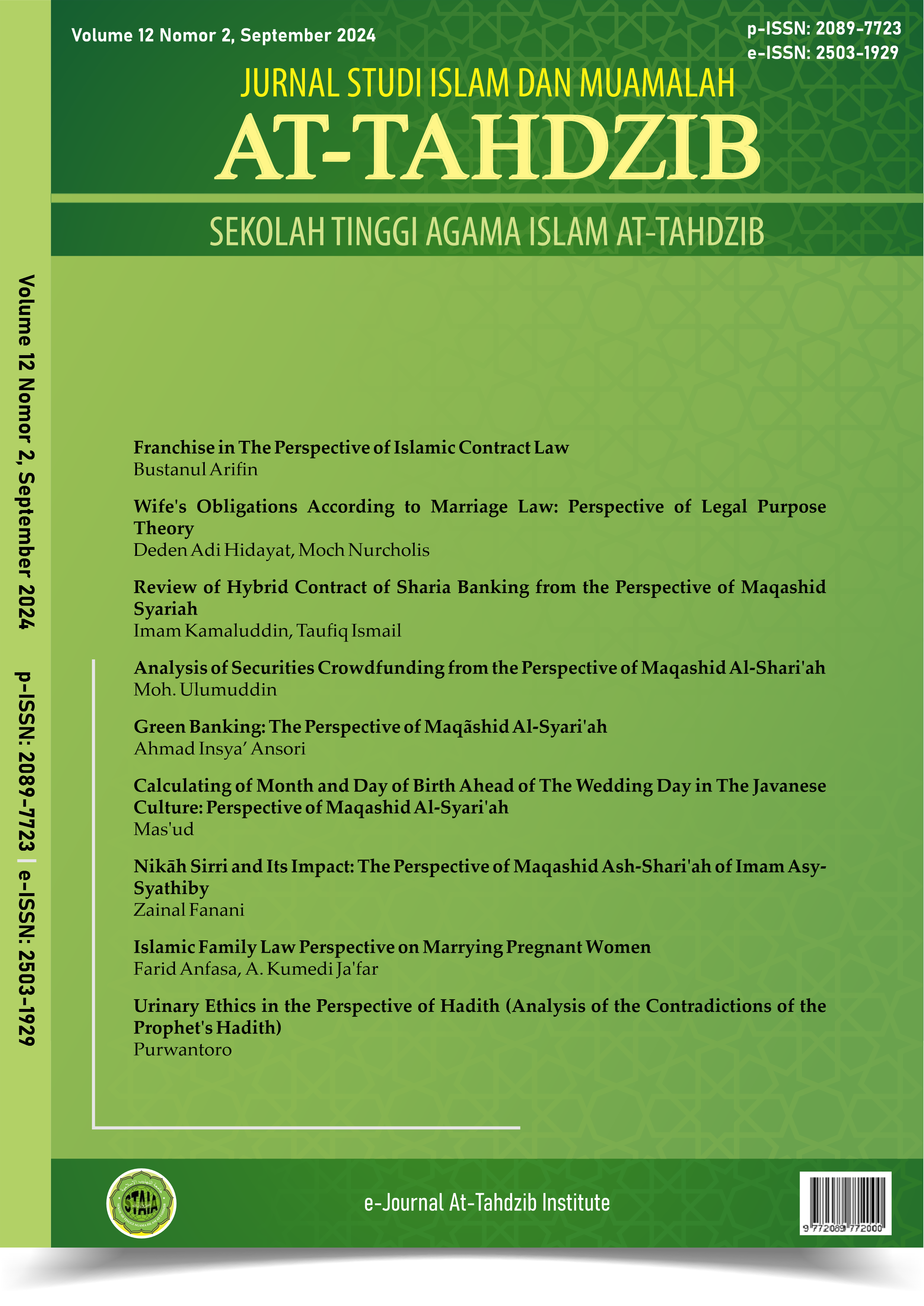Urinary Ethics in the Perspective of Hadith
(Analysis of the Contradictions of the Prophet's Hadith)
DOI:
https://doi.org/10.61181/at-tahdzib.v12i2.484Keywords:
Ethics, Urination, Hadith, Hygiene, Manners, IslamAbstract
Backgound. The ethics of defecating in Islam are not only related to physical cleanliness, but also include the spiritual and social dimensions of Muslims. The hadiths of the Prophet Muhammad SAW provide clear guidance on the procedures and manners of defecating, which aim to maintain cleanliness, health, and social harmony. Although textually we often encounter contradictions between hadits mukhtalif the ethics of defecating.
Aim. This article aims to analyze the ethics of defecating taught in the hadith, especially hadiths that textually appear to be mukhtalif. The author analyzes the main principles contained therein, and explores the relevance of these teachings in modern life.
Methods. With a textual and contekstual analysis approach to relevant hadiths. This article will reveal how important it is to interpret hadith contextually, and how to understand the mukhtalif hadiths.
Results. The hadith of the Prophet Muhammad SAW shows the Islamic religion's concern for cleanliness, politeness, and respect for certain places. After conducting in-depth research, it was found that there were no contradictions between the hadiths were found.
References
al-Adabi, Salahuddin ibn Ahmad, Metodologi Kritik Matan Hadits, Terj. Qadirun Nur dan Ahmad Musyafiq, Jakarta: Gaya Media Pratama, 2004.
al-'Aini, Badr al-Din Abi Muhammad Mahmud ibn Ahmad, 'Umdah al-Qari, Syarhu Shahih al-Bukhari, Beirut: Muhammad Amin Damj, t.th.
al-'Asqalani, Syihab al-Din Ahmad ibn Ali ibn Hajar, Fath al-Bari Syarh Sahih al-Bukhari, Beirut: Dar al-Kutub al-'Ilmiyyah, 1421H.
_______, Tahdzib al-Tahdzib, n.plc: Dar al-Fikr, 1415H.
al-Bukhari, Muhammad bin Ismail, Shahih al-Bukhari, Beirut: Dar Ibn Katsir, 1407H.
al-Hajjaj, Abu al-Husain Muslim bin, Sahih Muslim (n.plc.: Dar al-Fikr al-Dauliyyah, 1319H.
Al-Maza, al-Hafidz al-Muttaqin Jamal al-Din Abi al-Hajjaj Yusuf, Tahdzib al-Kamal fi Asmai al-Rijal, Beirut: Muassasah al-Risalah, 1405H.
al-Syafi'i, Ahmad bin Ali bin Hajar Abu al-Fadl al-Asqalani, Tahdzib al-Tahdzib, Beirut: Darul Fikr, 1404 H.
al-Tamimi, Abdurrahman bin Abi Hatim Muhammad bin Idris Abu Muhammad al-Razi, Al-Jarh wa At-Ta'dil.
Goel, Apul, dkk, Evaluation of Impact of Voiding Posture on Uroflowmetry Parameters in Men. World J Mens Health 2017 August 35(2): 100-106 https://doi.org/10.5534/wjmh.2017.35.2.100
Kousta, E., & Kirby, R. S. (2012). The effect of posture on voiding dynamics in men with lower urinary tract symptoms. Journal of Urology, 188(2), 612-617. https://journals.plos.org/plosone/article?id=10.1371/journal.pone.0101320
Downloads
Published
Issue
Section
License
Copyright (c) 2024 Purwantoro

This work is licensed under a Creative Commons Attribution 4.0 International License.




